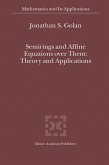A functional identity can be informally described as an identical relation involving arbitrary elements in an associative ring together with arbitrary (unknown) functions. The theory of functional identities is a relatively new one, and this is the first book on this subject. The book is accessible to a wide audience and touches on a variety of mathematical areas such as ring theory, algebra and operator theory.
A functional identity (FI) can be informally described as an identical relation involving(arbitrary)elementsinaringtogetherwith("unknown")functions;more precisely,elementsaremultipliedbyvaluesoffunctions.ThegoalofthegeneralFI theory is to determine the form of these functions, or, when this is not possible, to determine the structure of the ring admitting the FI in question. This theory has turnedouttobeapowerfultoolfor solvingavarietyofproblemsindi?erentareas. It is not always easy to recognize that the problem in question can be interpreted through some FI; often this is the most intriguing part of the process. But once one succeeds in discovering an FI that ?ts into the general theory, this abstract theory then as a rule yields the desired conclusions at a high level of generality. Among classical algebraic concepts, the one of a polynomial identity (PI) seems to be, at least on the surface, the closest one to the concept of an FI. In fact, a PI is formally just a very specialexample of an FI (where functions are polynomials).However,the theoryof PI'shasquite di?erent goalsthan the theory of FI's. One could say, especially from the point of view of applications, that the twotheoriesarecomplementaryto eachother.Under somenaturalrestrictions,PI theorydealswithringsthatareclosetoalgebrasoflowdimensions,whileFItheory gives de?nitive answers in algebras of su?ciently large or in?nite dimensions.
A functional identity (FI) can be informally described as an identical relation involving(arbitrary)elementsinaringtogetherwith("unknown")functions;more precisely,elementsaremultipliedbyvaluesoffunctions.ThegoalofthegeneralFI theory is to determine the form of these functions, or, when this is not possible, to determine the structure of the ring admitting the FI in question. This theory has turnedouttobeapowerfultoolfor solvingavarietyofproblemsindi?erentareas. It is not always easy to recognize that the problem in question can be interpreted through some FI; often this is the most intriguing part of the process. But once one succeeds in discovering an FI that ?ts into the general theory, this abstract theory then as a rule yields the desired conclusions at a high level of generality. Among classical algebraic concepts, the one of a polynomial identity (PI) seems to be, at least on the surface, the closest one to the concept of an FI. In fact, a PI is formally just a very specialexample of an FI (where functions are polynomials).However,the theoryof PI'shasquite di?erent goalsthan the theory of FI's. One could say, especially from the point of view of applications, that the twotheoriesarecomplementaryto eachother.Under somenaturalrestrictions,PI theorydealswithringsthatareclosetoalgebrasoflowdimensions,whileFItheory gives de?nitive answers in algebras of su?ciently large or in?nite dimensions.








